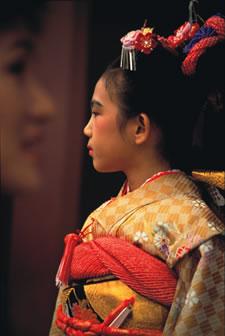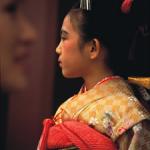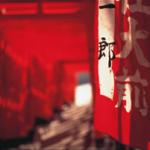Japanese Expressions

Every year on November 15, Japan celebrates Shichi-Go-San - Children's Day. Dressed in their very finest garments, girls and boys aged three, boys aged five, and girls aged seven, go with their families to nearby shrines, where they line up, sometimes for hours, to await their turn to be blessed by the presiding priest. After the blessing, the child is presented with a gift of long sticks of candy called chitose-ame, "thousand year sweets," wrapped in ornate bags decorated with cranes and turtles, both symbols of longevity.
Image © 2002 Robert George
A story told with photos.
 ThingsAsian
ThingsAsian



















